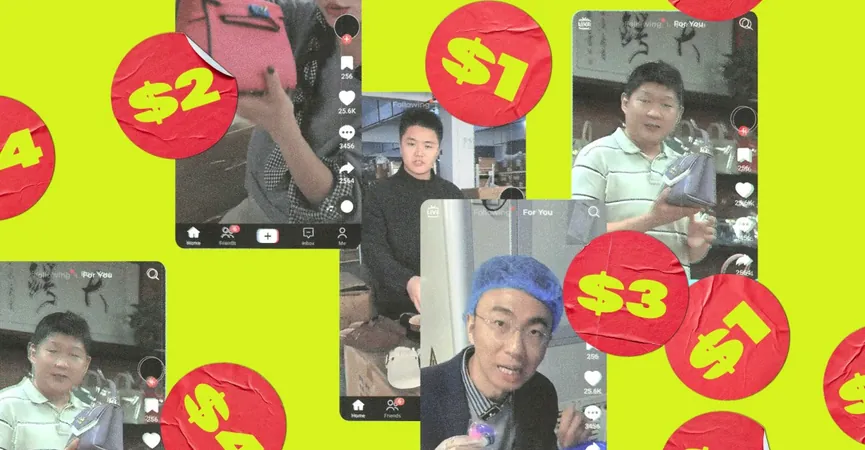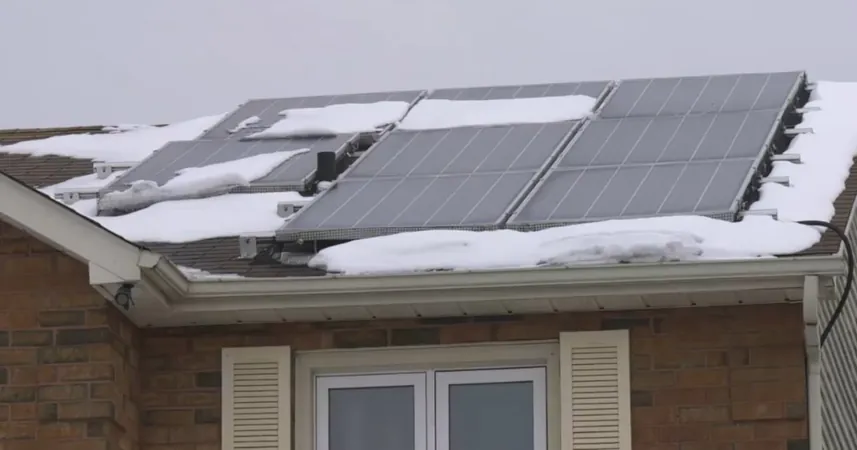
TikTok's Hidden Gems: How Chinese Factories Are Trolling American Shoppers
2025-04-15
Author: William
Imagine snagging the trendiest Hermès handbags or iconic Birkenstocks for a fraction of the price, directly from the source! This outrageous concept is becoming a viral sensation on TikTok, where clever videos showcase Chinese factories selling coveted American products at shockingly low prices.
In these upbeat clips, complete with catchy tunes and clever editing, factory workers display products that seem eerily similar to high-end goods. One viral TikTok featured a man showcasing knockoff Birkenstocks for just $10, compared to the original's hefty $165 price tag. Unsurprisingly, the video racked up millions of views before it was taken down.
Comments erupted with enthusiasm: ‘Chinese manufacturers calling out luxury brands is my new favorite TikTok!’ and ‘Let’s skip the retail stores and buy right from the source!’ These videos tap into the anxiety many Americans feel amidst rising tariffs and political drama.
With Trump’s administration imposing extreme tariffs on imported goods—like a staggering 145% on Chinese products—many Americans are realizing just how reliant they are on China. From tech gadgets to everyday clothing and home essentials, the supply chain runs deep. Against this backdrop, these TikTok videos promising bargain deals appear incredibly enticing, but there’s more than meets the eye.
Take the $10 Birkenstocks, for example. According to the official Birkenstock site, their clogs are made in Germany and the brand prides itself on resisting offshoring. Although some components may come from China, the final product is not what TikTokers are advertising. Through investigations, it’s become evident that many luxury items, even if labeled as being made in premium countries, often have roots in Chinese factories.
Delving deeper into TikTok's mysterious @china.yiwu.factor account reveals a link to an AliExpress store selling generic slip-on shoes for around $15. Sure, they look like Birkenstocks at first glance, but many customers have reported them as branded Kidmi or unbranded altogether, featuring inferior materials and designs.
Even if shoppers are enticed to buy these cheaper versions, they may not realize they’re experiencing a reduced quality—ironically fueling the notion of savvy shopping by skipping the middleman. Americans are notorious for their appetites for great deals and bargain hunting, but in doing so, are they sacrificing quality?
In another viral TikTok from user @luoluo.sunny, a woman showcases a collection of fake Louis Vuitton and Hermès bags, priced at around $30 each compared to their real-life counterparts, which can soar into the tens of thousands. There she is, flipping through vibrant knockoff bags as if she’s unearthing treasures in a consumerist wonderland, while the reality of rising living costs looms.
Jokingly, many viewers have noted how these factory videos flooding their feeds might just be a savvy move during a trade war, sparking humor and irony in 2023. "I think TikTok has switched to Chinese servers overnight!" one viewer quipped, racking up likes by the thousand. As direct-to-consumer imitation goods face potential price hikes due to tariffs, it's possible that Americans will soon find themselves reconsidering those cheap thrills.
While many may not purchase directly from these TikTok accounts, the underlying messages they convey could bolster China’s reputation amidst waning American influence. Whether through the allure of affordable home décor or the quest for high-end knockoffs, the narrative is clear: in today’s economy, those ‘too good to be true’ deals come at a cost. So, are you willing to gamble on quality for a bargain?









 Brasil (PT)
Brasil (PT)
 Canada (EN)
Canada (EN)
 Chile (ES)
Chile (ES)
 Česko (CS)
Česko (CS)
 대한민국 (KO)
대한민국 (KO)
 España (ES)
España (ES)
 France (FR)
France (FR)
 Hong Kong (EN)
Hong Kong (EN)
 Italia (IT)
Italia (IT)
 日本 (JA)
日本 (JA)
 Magyarország (HU)
Magyarország (HU)
 Norge (NO)
Norge (NO)
 Polska (PL)
Polska (PL)
 Schweiz (DE)
Schweiz (DE)
 Singapore (EN)
Singapore (EN)
 Sverige (SV)
Sverige (SV)
 Suomi (FI)
Suomi (FI)
 Türkiye (TR)
Türkiye (TR)
 الإمارات العربية المتحدة (AR)
الإمارات العربية المتحدة (AR)